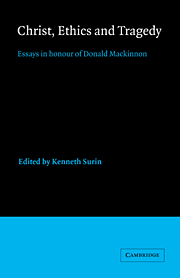Book contents
- Frontmatter
- Contents
- Preface
- Donald MacKinnon
- 1 Theological rhetoric and moral passion in the light of MacKinnon's ‘Barth’
- 2 Idealism and realism: an old controversy dissolved
- 3 Modes of representation and likeness to God
- 4 MacKinnon and the parables
- 5 Trinity and ontology
- 6 Some aspects of the ‘grammar’ of ‘incarnation’ and ‘kenosis’: reflections prompted by the writings of Donald MacKinnon
- 7 Tragedy and atonement
- 8 MacKinnon and the problem of evil
- 9 Pride and international relations
- 10 ‘Between purgation and illumination’: a critique of the theology of right
- 11 On being ‘placed’ by John Milbank: a response
- Index of names
- Index of subjects
11 - On being ‘placed’ by John Milbank: a response
Published online by Cambridge University Press: 11 March 2010
- Frontmatter
- Contents
- Preface
- Donald MacKinnon
- 1 Theological rhetoric and moral passion in the light of MacKinnon's ‘Barth’
- 2 Idealism and realism: an old controversy dissolved
- 3 Modes of representation and likeness to God
- 4 MacKinnon and the parables
- 5 Trinity and ontology
- 6 Some aspects of the ‘grammar’ of ‘incarnation’ and ‘kenosis’: reflections prompted by the writings of Donald MacKinnon
- 7 Tragedy and atonement
- 8 MacKinnon and the problem of evil
- 9 Pride and international relations
- 10 ‘Between purgation and illumination’: a critique of the theology of right
- 11 On being ‘placed’ by John Milbank: a response
- Index of names
- Index of subjects
Summary
I have always thought that one of the most interesting questions in philosophical psychology is whether another can understand us better than we understand ourselves. In principle I have wanted to argue the positive side of that case not only because it often empirically seems to be the case but because questions of the truthfulness of narrative construals hang on that issue. Maclntyre makes this point quite nicely in the ‘Postscript’ to the second edition of After Virtue by noting:
If some particular moral scheme has successfully transcended the limitations of its predecessors and in so doing provided the best means available for understanding those predecessors to date and has then confronted successive challenges from a number of rival points of view, but in each case has been able to modify itself in the ways required to incorporate the strengths of those points of view while avoiding their weaknesses and limitations and has provided the best explanations so far of those weaknesses and limitations, then we have the best possible reason to have confidence that future challenges will also be met successfully, that the principles which define the core of a moral scheme are enduring principles.
(p. 270)It is therefore with some concern that I respond to Milbank's extraordinary and wide-ranging paper. I feel at once embarrassed to be associated with a thinker so substantive and profound as MacKinnon but complimented that Milbank is able to put us in conversation. I feel like the young student who is told that what he just said is extremely interesting and important and is not even sure what it is he said.
- Type
- Chapter
- Information
- Christ, Ethics and TragedyEssays in Honour of Donald MacKinnon, pp. 197 - 201Publisher: Cambridge University PressPrint publication year: 1989
- 1
- Cited by



